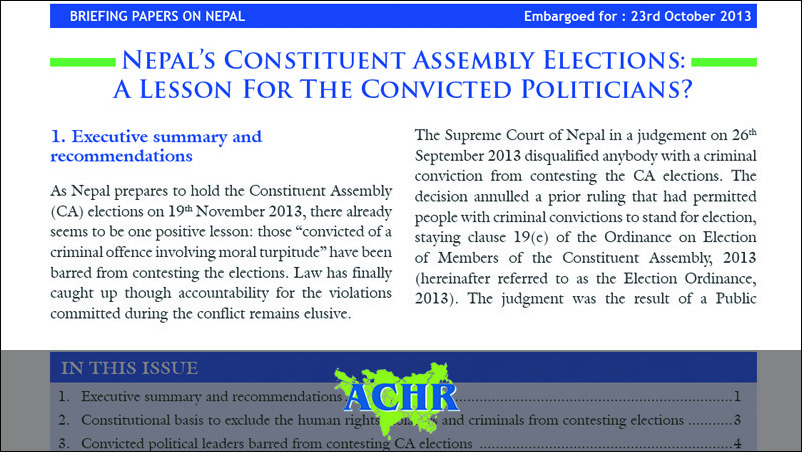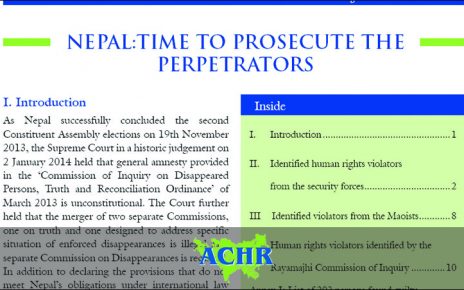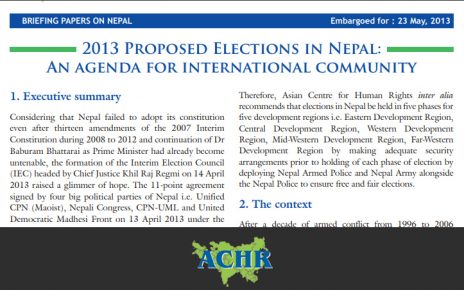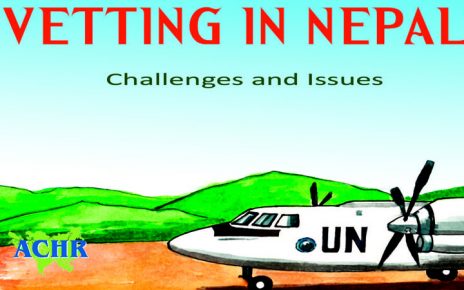As Nepal prepares to hold the Constituent Assembly (CA) elections on 19th November 2013, there already seems to be one positive lesson: those “convicted of a criminal offence involving moral turpitude” have been barred from contesting the elections. Law has finally caught up though accountability for the violations committed during the conflict remains elusive.
The Supreme Court of Nepal in a judgement on 26th September 2013 disqualified anybody with a criminal conviction from contesting the CA elections. The decision annulled a prior ruling that had permitted people with criminal convictions to stand for election, staying clause 19(e) of the Ordinance on Election of Members of the Constituent Assembly, 2013 (hereinafter referred to as the Election Ordinance, 2013). The judgment was the result of a Public
Interest Litigation filed challenging the constitutional validity of Clause 19(e) of the Election Ordinance, 2013.
The judgement of the Supreme Court left no alternative for the major political parties such as the Unified Communist Party of Nepal (UCPN), the Nepali Congress (NC), Communist Party of Nepal (Unified Marxist Leninist) (CPN-UML) and the Mahdesi political parties but to deny tickets to the convicted political leaders.
Among those who have been denied tickets by their political parties, UCPN leader Mr Bal Krishna Dhungel is perhaps the most high profile leader. He remains at liberty despite having been convicted for murder of Mr Ujjan Shrestha alias Bhuwan, of Pokali Village Development Committee-2 under Okhaldhunga district on 24 June 1998. However, the fact that Mr Dhungel cannot contest elections sends a strong message.
Other political leaders who have been convicted for corruption include former Nepali Congress Ministers Mr Chiranjivi Wagle, Mr Khum Bahadur Khadka and Mr Govinda Raj Joshi; CPN-UML former Constituent Assembly member Mr Dol Bahadur Karki; and Madeshi Minister Mr J P Gupta. All these leaders have been denied election tickets.
However, a number of leaders who are facing serious charges of human rights violations are still contesting the CA elections.
The UCPN has given tickets to many serious human rights violators. Mr Agni Sapkota, accused of killing Mr Arjun Lama in 2004 is contesting from Sindhupalchok-2 constituency while his co-accused Mr Surya Man Dong is contesting from Karve constituency. Further, Mr Keshav Rai, charged with murdering Mr Guru Prasad Luitel is contesting from Okhaldhunga-1 constituency and Mr Prabhu Shah, an accused in the murder of Hindu activist Mr Kashiram Tiwari, is contesting from Rautahat-3 constituency.
The CPN-UML has given ticket to Mr Ram Dayal Mandal to contest from Mahottari District. Mr Mandal was convicted to 26 months imprisonment for assault and was earlier recommended for amnesty by then Prime Minister Dr Baburam Bhattarai.
Madhesi political parties are not too far behind. Madhesi Janadhikar Forum-Nepal has fielded Mr Babban Singh, who faces murder charges while gangster Mr Ganesh Lama, who has been released from prison on bail, has filed his nomination from Kavre-2 constituency under the Bijaya Kumar Gachhadar-led Madhesi Janaadhikar Forum-Democratic.
The Nepali Congress fielded Mr Rajesh Kaji Gurung and Mr Yam Bahadur Pariyar who are facing charges of irregularities.
The implementation of the Supreme Court order by the political parties and denial of tickets to the convicted ones has removed some of the worst offenders from contesting the CA elections. This should act as a deterrent. As of May 2013, around 300 corruption cases filed by the Commission for Investigation of Abuse of Authority (CIAA) were pending before the Supreme Court7 and many of these are against the political leaders.
The Election Commission of Nepal has the primary responsibility to disqualify candidates with criminal records.
Asian Centre for Human Rights recommends to the Election Commission of Nepal to rigorously scrutinise the candidates to ensure that those who have been convicted of minor offences do not contest the CA elections.




